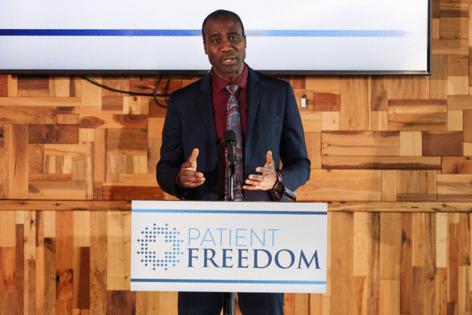Florida Surgeon General Joseph Ladapo's statement equating vaccines with slavery perplexes Black leaders, doctors
Published in News & Features
Florida Surgeon General Joseph A. Ladapo’s recent announcement about ending vaccine mandates — and his comparison of forced vaccination to slavery — has stirred outrage among Black leaders and health experts who recall the devastation diseases like polio, mumps and measles once had on their communities.
Congresswoman Frederica Wilson, a former educator in Miami-Dade County, was aghast by the announcement. She still recalls a time when she had children in her class who had polio, worms or impetigo on their legs. “Our children had polio, and they suffered,” she told the Miami Herald. “They had braces, some died.”
She said eliminating requirements for childhood vaccines against diseases like measles, mumps, rubella and polio would be devastating. “What are we trying to say? What are we actually saying? That we want these children to just die or just be sick or not survive?” she said. “I’m perplexed, and it’s all the way up to the White House.”
Wilson said she was especially disturbed that Ladapo, who is Black, compared mandates to slavery. Ladapo said at a press conference early in September that said forcing vaccine mandates is “wrong and drips with disdain and slavery.”
“That is not even an acceptable sentence that should come out of his, anyone’s thought process, but especially a Black man’s thought process or mind. There’s no connection whatsoever,” Wilson said.
In Florida, immunization among Black children aged 35 months has been on the decline, according to data collected by State Health Access Data Assistance Center. Between 2017 and 2023 the percentage of Black children aged 35 months that received vaccines slid from 78% to 72%.
Ladapo still has not offered specific policy information but promised to end “every last one” of Florida’s vaccine mandates. Florida immunization requirements for students include vaccines against polio, diphtheria, measles, mumps, rubella, hepatitis B among others. Removing all mandates would require the Legislature to get involved, but Ladapo and Gov. Ron DeSantis can make several changes without passing a bill.
Nelson Adams, a practicing obstetrician gynecologist in Miami-Dade County, said many in the Black community had the same reaction as Wilson. “When I heard that, I just scratched my head. It was a total disconnect,” he said. “It makes it even more difficult, because he is a person of color, so it is a huge gut blow.”
Adams credited vaccines with extending the life expectancy for communities of color. “The focus on public health has been a game changer, particularly for Black and brown and underserved communities, because it is because these diseases have been prevented that we’ve had a better quality of life,” he said. Life expectancy for Black people is still five to seven years lower than that of white people, according to U.S. Census data, so public health initiatives are needed to continue to work on these disparities, Adams said.
But mistrust around vaccines persists, fueled by historic public health scandals like the Tuskegee Study, where a group of Black men were misled to believe they were being treated for syphilis between 1932 and 1972. Even though treatments were available at the time, researchers wanted to observe the effects of the disease when untreated. “It still resonates in Black and brown communities, because it was an injustice,” Adams said. “When we get this kind of information coming from high places, people get very confused because mixed messages cause folk to hit the pause button.”
Adams said the COVID-19 vaccines also caused skepticism in Black community around public health. “Many people became antivaxxers, and there’s nothing wrong with being cautious and getting as much information as you possibly can, but it needs to be from the right source,” he said.
Aileen Marty, an infectious disease expert at Florida International University, warned that removing vaccine requirements would leave children vulnerable to illnesses many parents no longer recognize. “Anyone who’s not getting the vaccine, including black children, are going to be at risk,” Marty said. “Unless we have a good public health system that supplies vaccines for free, they’re not going to have them. It just boils down to access.”
Wilson cautioned against the harms of anti-vaccine messaging and the impact it can have on those who believe in misinformation or conspiracy theories. “They don’t really think about the consequences or the impact. They just think about ‘what kind of pain is this going to cause my child?’” she said. “They don’t think about not having the vaccine is detrimental and a deficit.”
Adams urged people to rely on their physicians for advice and to use “good old-fashioned common sense.”
“Those in my generation remember firsthand the impact of those diseases,” Adams said continued. “The younger generation has never seen it.”
_____
©2025 Miami Herald. Visit miamiherald.com. Distributed by Tribune Content Agency, LLC.







Comments